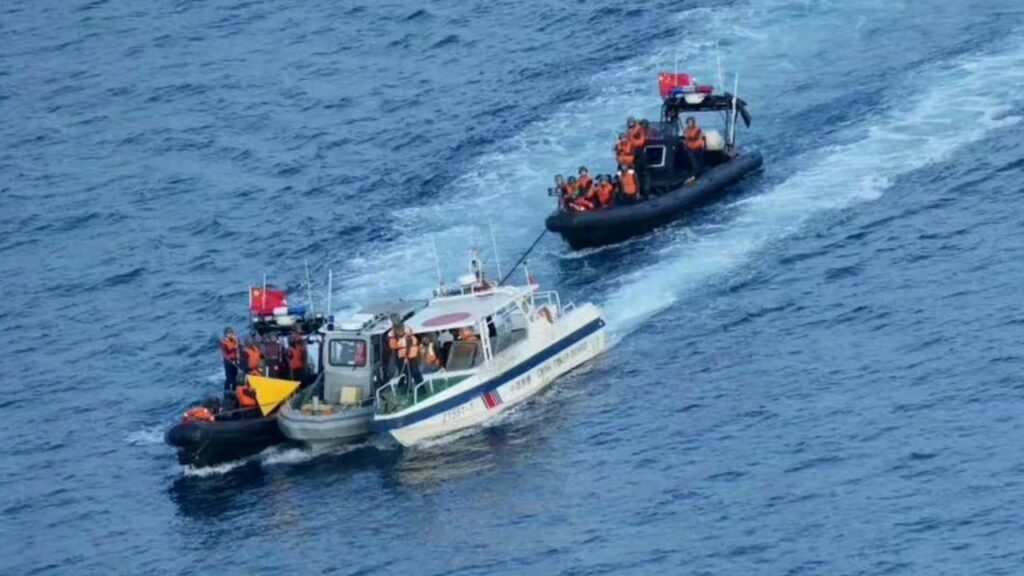On Wednesday, the Philippine ambassador to the United States Jose Manuel Romualdez also said Manila wants talks to take place “early next month”, adding: “I don’t think China wants to have a major conflict. And definitely we do not want to have one. And so, that’s a good starting point.”
China has not confirmed if the talks will go ahead and the foreign ministry did not respond to a request for comment.
China claims most of the South China Sea but the Philippines, Vietnam, Malaysia, and Brunei all have competing claims over the resource-rich waterway.
In recent years Manila has been the most assertive in countering Beijing’s claims and there have been a series of clashes around disputed reefs in recent months.
02:34
Chinese and Philippine ships clash in first incident under Beijing’s new coast guard law
Chinese and Philippine ships clash in first incident under Beijing’s new coast guard law
The presence of Philippine troops on the BRP Sierra Madre, a decrepit World War II-era ship that was deliberately grounded on the reef in 1999, has resulted in a series of confrontations between Chinese coastguards and ships carrying supplies.
Last week, a sailor lost a thumb after Chinese coastguards armed with knives, machetes, and other weapons intercepted troops on a resupply mission to Second Thomas Shoal, according to the Philippines military.
In a phone call with Chinese Foreign Vice-Minister Ma Zhaoxu, US Deputy Secretary of State Kurt Campbell “raised serious concerns” regarding China’s “destabilising actions” in the South China Sea, including at Second Thomas Shoal.
According to a US State Department readout, Campbell also reiterated that US commitments to the Philippines under the 1951 Mutual Defence Treaty remain ironclad.
Ding Duo, an associate research fellow at China’s Hainan-based National Institute for South China Sea Studies, said: “At present, it is hard to say whether significant results can be achieved [in the talks]. It will mainly depend on whether the two sides can reach a certain consensus on controlling maritime differences.”
He added that both Beijing and Manila want to try to calm the situation, which he said was “overheating”.
“The Philippines does not want to go as far as a large-scale conflict with China or even war,” he said.
Ding also said Beijing wanted to “manage differences, de-escalate the situation and maintain peace and stability”.
However, he warned there is currently “very little consensus and very little mutual trust” but added that talks may be of “some help in enhancing mutual trust and keeping the [negotiating] mechanism running”.
On Sunday President Ferdinand Marcos Jnr said the Philippines should “refuse to play by the rules that force us to choose sides in a great power competition.”
He added that Manila will seek to “settle all these issues peacefully” but its “calm and peaceful disposition should not be mistaken for acquiescence”.
Philippine Foreign Minister Enrique Manalo said Manila was committed to building confidence. Photo: EPA-EFE
The most recent high-level talks between China and the Philippines in January made little progress.
Ding said the Philippine armed forces may now be hoping for time to adjust to the situation.
“The consultative mechanism between China and the Philippines, to some extent, is being used by the Philippines as a kind of palliative to put off [conflict] and buy time for the next move,” he said.
But Jay Batongbacal, director of the University of the Philippines Institute for Maritime Affairs and Law of the Sea, said a major challenge for the potential talks is to reach an acceptable modus vivendi, not including “the regular employment of coercion and unilateral imposition by China upon the Philippines”.
“Unless China recognises that the Philippines has its own individual national interests and removes the obstacles, the Philippines will naturally and logically keep turning to its allies, partners and friends in the international community to address the coercive pressures from China,” he said.
Since coming to power, Marcos has moved to strengthen military ties with the United States, a long-term ally.
Although Washington “welcomes the Philippine tilt towards the US”, it is mindful of broader regional sensitivities, said Dylan Loh, an assistant professor in the Public Policy and Global Affairs Programme at Singapore’s Nanyang Technological University.
02:37
Philippine admiral at centre of ‘new deal’ saga breaks silence on alleged South China Sea pact
Philippine admiral at centre of ‘new deal’ saga breaks silence on alleged South China Sea pact
“I think Washington will certainly welcome any talks that reduce the risk of the situation from deteriorating even further and it certainly does not want to see conflicts in the SCS [South China Sea] that may eventually entangle itself,” Loh said.
Last week Nicholas Burns, the US ambassador to China, told the BBC that Beijing and Washington are talking more regularly to avoid a conflict in the South China Sea despite their “contentious and competitive” relationship.
He added that “the last thing we want is an accident, a misunderstanding that leads to conflict”.
>>> Read full article>>>
Copyright for syndicated content belongs to the linked Source : SCMP.com – https://www.scmp.com/news/china/diplomacy/article/3268342/south-china-sea-philippines-seek-talks-expectations-breakthrough-low?utm_source=rss_feed
